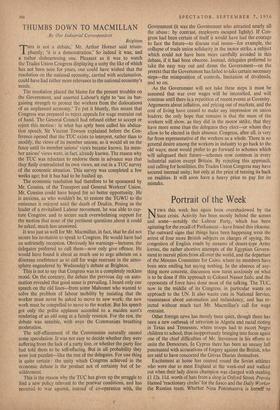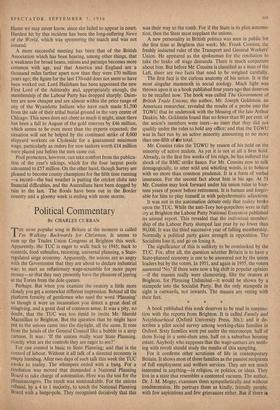Portrait of the Week
EWS this week has again been overshadowed by the IN Suez crisis. Activity has been mostly behind the scenes and some—notably the Labour Party, which has been agitating for the recall of Parliament—have found this irksome. The outward signs that things have been happening were the arrest of four more British subjects on charges of spying, the congestion of English roads by streams of desert-type Army lorries, the rather abortive attempts of the Egyptian Govern- ment to recruit pilots from all over the world, and the departure of the ,Menzies Committee for Cairo, where its members have been seen smiling but saying nothing. In the absence of any- thing more concrete, discussion now turns anxiously on what is to be done if this approach to Colonel Nasser fails; and the opponents of force have done most of the talking. The TUC, now in the middle of its Congress, in particular wants an approach to the UN. It also wants cuts in National Service, reassurance about automation and redundancy, and has re- jected without much tact Mr. Macmillan's call for wage restraint.
Other foreign news has mostly been quiet, though there has been a new outbreak of terrorism in Algeria and racial rioting in Texas and Tennessee, where troops had to escort Negro children to school, thus inopportunely bringing into focus again one of the chief difficulties of Mr. Stevenson in his efforts to unite the Democrats. In Cyprus there has been an uneasy lull punctuated with accusations of forgery against the British, who are said to have concocted the Grivas Diaries themselves. blame we may never know, since she failed to appear in court. Hardest hit by this incident has been the long-suffering News of the World, which was sponsoring the match and was not insured.
A more successful meeting has been that of the British Association which has been hearing, among other things. that a weakness for broad beans, onions and parsnips becomes more common with age, and that America and England are a thousand miles farther apart now than they were 170 million years ago; the figure for the last 170-odd does not seem to have been worked out. Lord Hailsham has been appointed the new First Lord of the Admiralty and, appropriately enough, the membership of the Labour Party has dropped sharply. Daim- lers are now cheaper and are almost within the price range of any of the Wyandotte Indians who have each made $1,700 from the sale of their tribal burial ground in the very centre of Chicago. This news does not cheer as much it might, since there has been a fall in August of the gold reserves by £46 million, which seems to be even more than the experts expected; the situation will not be helped by the continued strike of 8,000 shipyard workers on Clydeside for a guaranteed minimum wage. particularly as orders for new tankers worth £14 million were placed just before the men came out.
Pool promoters, however, can take comfort from the publica- tion of the year's takings, which for the four largest pools amounted to £57 million. On the other hand, though Surrey are pleased to become county champions for the fifth time running —a record—the bad weather is putting the cricket clubs into financial difficulties, and the Australians have been dogged by rain to the last. The floods have been out in the Border country and a gloomy week is ending with more storms.



































 Previous page
Previous page